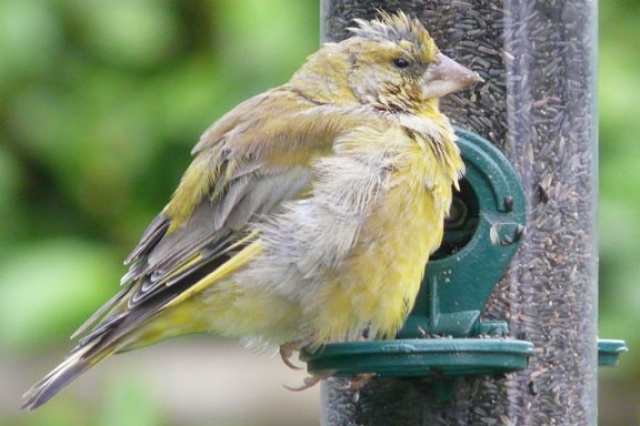Clean, clean, clean to halt winter bird diseases
The RSPB is urging good hygiene around bird feeders, tables and water baths to help garden birds stay healthy this winter. Cold weather can trigger outbreaks of diseases that seriously affect garden birds, and the wildlife charity has released advice on how to help reduce the risk of infections spreading. Wild birds in gardens are susceptible to a variety of diseases, such as certain strains of salmonella in winter and trichomoniasis in late summer and autumn.

Diseased Greenfinch. (Photo: RSPB)
And as the weather gets colder, larger numbers of birds visit gardens for our food supplies and fresh, unfrozen water, making it easier for disease to spread. The diseases can spread especially quickly if droppings are allowed to mix with uneaten food. In really cold snaps, birds' resistance to illness becomes even lower, making them particularly vulnerable, and disease can easily kill them. But the RSPB believes that taking steps to keep feeding stations clean and healthy can be very effective in protecting garden birds. It's extremely rare for any bird diseases to pass to people or to pets like cats and dogs. Nevertheless, the RSPB recommends careful hand washing after cleaning feeders and water baths.
The charity says that choosing feeders and water baths that can be thoroughly cleaned in the first instance is vital. They suggest:
- Smooth feeders and water baths with no corners that could trap food or dirt
- Feeders with drainage holes to avoid moisture building up
- Using more than one feeding site to reduce the number of birds in one place
- Rotating feeders around several locations to 'rest' each spot to prevent build up of infection on the ground underneath.
- Cleaning and disinfecting feeders and water baths regularly
- Rinsing thoroughly and allowing to air dry completely — this itself will kill some diseases
- Keeping the bucket and brush you clean feeders with outside and using just for this purpose
- Sweeping up droppings and spilt or old food and disposing of it carefully in an outside bin
- Changing the water in baths frequently — ideally daily
- Washing hands carefully afterwards

Diseased Greenfinch. (Photo: RSPB)
Sick birds can be very obvious. Typical signs include lethargy and fluffed-up plumage. In some diseases, there are additional symptoms such as drooling saliva, regurgitating food, difficulty swallowing and laboured breathing. Some may have matted wet plumage around the face and beak or swelling in the neck.
The RSPB's Kirsi Peck says: "As the weather gets colder, and our birds come into our gardens in bigger numbers, it is no surprise they can become vulnerable to diseases. It can be very distressing to find sick or dead birds, but there are things you can do to avoid it happening. We all think good hygiene is important in our homes and it need be no great effort to do the same in our garden. We'd urge everyone to clean their baths and feeders regularly to help keep garden bird infections to a minimum."
The RSPB is monitoring garden bird disease as part of the Garden Bird Health Initiative. For more information and advice on sick and injured birds visit www.rspb.org.uk/advice.
If you are worried about sick or dead birds in your garden email the RSPB’s wildlife enquiries team at wildlife@rspb.org.uk or call 01767 693690.

